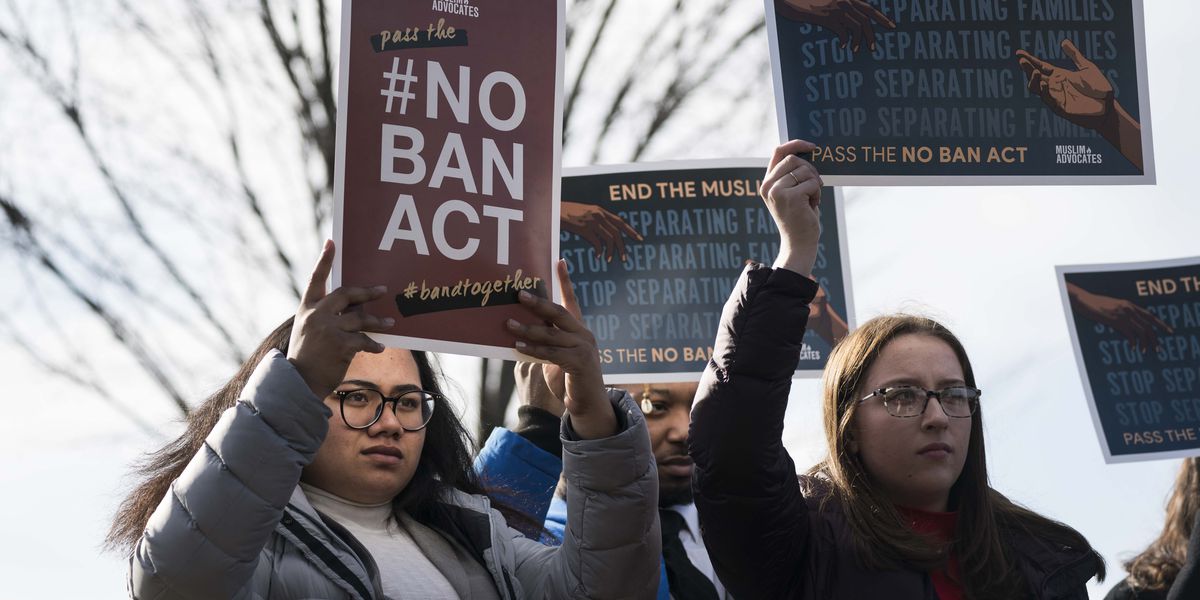Read more about InAlienable.Support Quixote Center’s InAlienable program!
InAlienableDaily Dispatch
February 3, 2020

Friday afternoon Trump announced an expansion of a travel ban he instituted early in his presidency. The original travel ban went through several iterations before the Supreme Court allowed its implementation - elements of the ban are still under court review. The current list of countries impacted by the original (as amended) ban is: Iran, Libya, Somalia, Syria, Yemen, Venezuela and North Korea
Trump used the anniversary of his original executive order to announce new travel restrictions impacting six more countries. Citizens from Nigeria, Eritrea, Sudan, Tanzania, Kyrgyzstan and Myanmar will now be blocked from obtaining certain types of visas. It is important to underscore that unlike the original ban, people from these countries can still travel to the United States under tourist visas. However, the new ban essentially disallows people from Nigeria, Eritrea, Kyrgyzstan and Myanmar from visa categories that would allow them to qualify for permanent residence. Sudan and Tanzania have been denied access to the “Visa lottery” system. This is one of Trump’s favorite targets - but there is nothing lottery like about it. The system was designed to provide space for people from countries with historically low levels of immigration to the United States, and is thus a function of the regional caps that constrain the current issuance of visas.
The acting head of the Department of Homeland Security, Chad Wolf, claimed the restrictions were the result of these countries’ failure to meet security and information disclosure standards set by DHS.
In response to these various visa restrictions, new legislation has been introduced in the House. From Axios: "In the coming weeks, the House Judiciary Committee will mark-up and bring to the Floor the NO BAN Act to prohibit religious discrimination in our immigration system and limit the President’s ability to impose such biased and bigoted restrictions," House Speaker Nancy Pelosi said Friday in a statement.
The No Muslim Ban Ever coalition issued a statement denouncing the expansion of travel restrictions. Avideh Moussavian, legislative director at the National Immigration Law Center, said,
“Today's new ban is rooted in the same animus that was the driving force behind the Muslim ban and reaffirms Trump's cruel commitment to keeping out communities of color. Including countries that are not Muslim- or black-majority doesn't hide the reality that this new ban will impact Muslims and, in particular, black immigrants the most. It's imperative that we keep calling out these policies for what they are — attempts to change the complexion of our country and disenfranchise communities of color — and fight to repeal them in our courts and in Congress.”
The people most impacted by these new rules are citizens of Nigeria, who are by far the largest group of the countries included to have been issued visas in FY 2018 (just over 8,000 visas in FY 2018). Indeed, one of the chief impacts of this expansion, like the original ban, will be to keep families apart. From CNN:
The Association for Credible leadership in Nigeria (ACLN) says in the Change.org petition, "With this new travel ban in effect from February 21st 2020... U.S citizens looking to bring over children, parents or siblings will no longer be able to do so. Also, partners or spouses of American citizens will no longer be able to immigrate to the U.S."
The policy seems aimed at generating conflict in the context of the election - as it has little to do with actual security. From Common Dreams:
The National Partnership for New Americans noted the administration's antipathy to refugee resettlement and immigration in a press release condemning the policy, saying Trump's actions are making the U.S. into "just another nation that turns its back on people who need help most."
"This is an outright attempt to discriminate against people on religious, racial and ethnic grounds and to dismantle the refugee resettlement program," said organizer Basma Alawee, "which benefits mainly African and other Global South countries and has saved thousands of lives throughout the decades."
All this seems to create a debate Trump welcomes - indeed, Peter Beinhart writing in anticipation of the new restrictions last week for The Atlantic, said:
So Trump is diversifying his array of immigrant threats. Singling out African countries could spark a public battle with the Congressional Black Caucus, Somalian-American Representative Ilhan Omar, and African American celebrities—just the sort of foes who rouse Trump’s base. Expect presidential tweets and Tucker Carlson monologues about Nigerian email scammers and crime rates in Lagos. In Trump’s ceaseless battle to terrify Republicans with the specter of an America no longer controlled by white men, a new front may be opening up.
